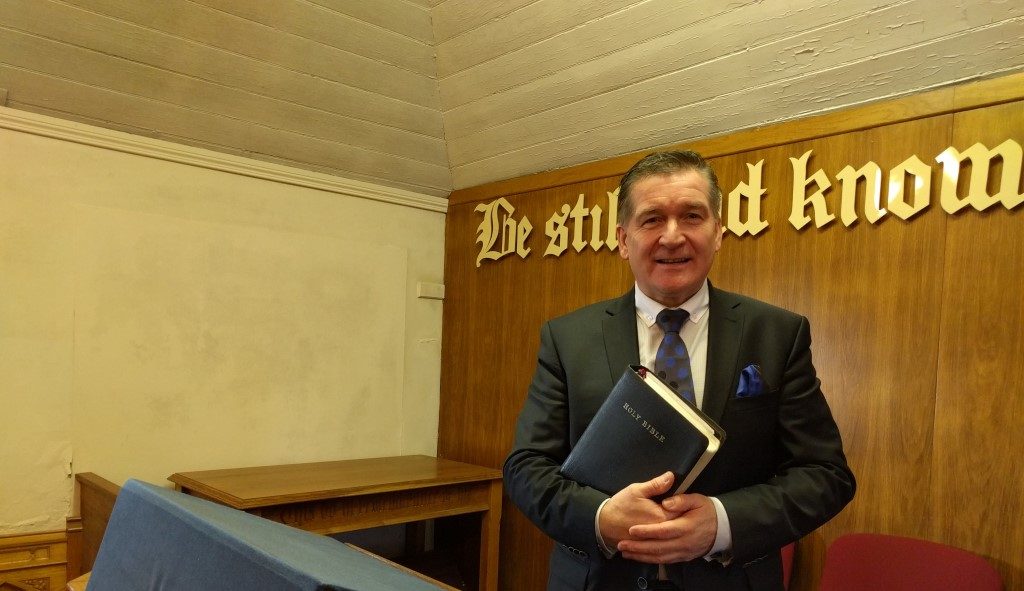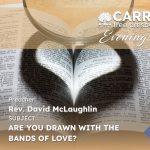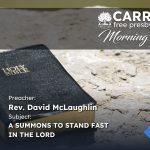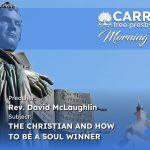Date: SUN 7:00 PM 11th May 2025
Preacher: Rev. David McLaughlin
Bible Reference: Galatians 5:1
Stand fast therefore in the liberty wherewith Christ hath made us free, and be not entangled again with the yoke of bondage.
Summary of Sermon on Galatians 5:1 – “A Call to Stand Fast in Gospel Freedom”
Text: Galatians 5:1 – “Stand fast therefore in the liberty wherewith Christ hath made us free, and be not entangled again with the yoke of bondage.”
Context and Theme: The sermon, delivered on the 80th anniversary of Victory in Europe (VE) Day (May 8, 2025), draws a parallel between the hard-won freedom from Nazi tyranny in World War II and the spiritual freedom granted through the gospel of Jesus Christ. The preacher emphasizes the cost of freedom, both in war and in salvation, and urges believers to stand firm in the liberty provided by Christ, avoiding a return to the bondage of legalism or sin.
Key Points:
- Historical Context – VE Day and Freedom:
- VE Day (May 8, 1945) marked the Allied victory over Nazi Germany after six years of World War II, a conflict costing 80 million lives.
- The end of the war brought freedom from fear and tyranny, celebrated with joy across the UK. However, freedom came at a great cost—blood, sweat, and tears.
- The preacher reflects on the need for eternal vigilance to maintain peace and freedom, trusting in God for national, personal, and spiritual deliverance.
- Biblical Context – Galatians 5:1:
- The Apostle Paul wrote Galatians as an urgent letter to counter false teachings undermining the gospel of grace. The verse is a call to stand firm in the freedom Christ provides, resisting entanglement in legalistic bondage (e.g., works-based righteousness).
- The “therefore” in Galatians 5:1 connects to the preceding chapters, which emphasize salvation through Christ’s sufficiency, not human effort. Key themes include:
- Justification by faith alone (Galatians 2:16).
- Freedom from the curse of the law through Christ’s redemptive work (Galatians 3:13).
- The sufficiency of Christ’s atoning sacrifice.
- The Identity of Gospel Liberty:
- This liberty is spiritual freedom through Christ, who liberates believers from:
- The penalty and power of sin (John 8:32-36).
- The curse of the law (Galatians 3:13).
- The need for works-based righteousness (Isaiah 61:1-2).
- It is not a license to sin (e.g., drunkenness, immorality) or to live as one pleases, as some misinterpret. True gospel freedom is freedom to live righteously in Christ, not to indulge in licentiousness.
- This liberty is spiritual freedom through Christ, who liberates believers from:
- The Victory of Gospel Liberty:
- Christ’s perfect obedience and atoning death satisfy the law’s demands, granting believers justification by faith (Romans 3:24; Galatians 2:16).
- This truth fueled the Reformation, freeing believers like Martin Luther from religious legalism. Luther’s stand at the Diet of Worms (1521) exemplified a conscience captive to Scripture alone.
- Believers are legally declared righteous through Christ’s imputed righteousness, not their own merits, a doctrine central to the gospel.
- The Spirituality of Gospel Liberty:
- While civil freedoms (e.g., speech, worship) are valuable, gospel freedom is the greatest liberty, breaking the dominion of sin, Satan, and the world.
- Paul’s testimony before Festus and Agrippa (Acts 26:24-29), despite being in chains, illustrates this spiritual freedom, which began on the Damascus Road and propelled his ministry.
- Christians are called to stand fast in this liberty, contending for the gospel against false teachings, as Paul did.
- The Vulnerability of Gospel Liberty:
- Believers risk returning to bondage by relying on works to earn God’s favor, a danger Paul warns against (Galatians 5:4).
- The medieval church’s decline into legalism and the modern resurgence of works-based systems highlight this vulnerability.
- The preacher urges believers to sense their bondage (to sin, guilt, or worldly allurements) and seek Christ, the Liberator, who alone sets free (Galatians 5:6).
Application:
- Reflecting on VE Day, believers should cherish gospel freedom, won at the cost of Christ’s sacrifice, and remain vigilant to preserve it.
- Avoid misusing liberty as a license to sin or reverting to legalism. Instead, live in the freedom of Christ’s righteousness, marked by faith and love for God.
- Point others to Christ, the true Liberator, who frees from sin and grants eternal justification.
Conclusion: The sermon calls Christians to stand fast in the gospel freedom Christ provides, rejoicing in its victory, embracing its spiritual reality, and guarding against entanglement in the yoke of bondage. Just as VE Day commemorates a costly victory, the gospel celebrates Christ’s finished work, urging believers to trust in Him alone for salvation.
Subscribe to the podcast here:
Spotify Podcasts | Apple Podcasts | Pocket Casts
Email | RSS | more information here







